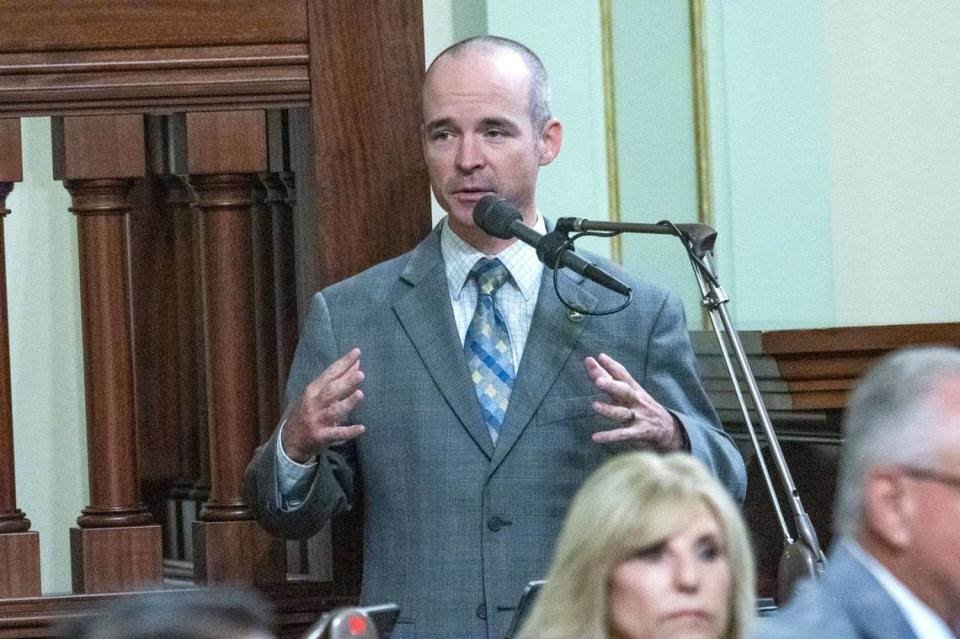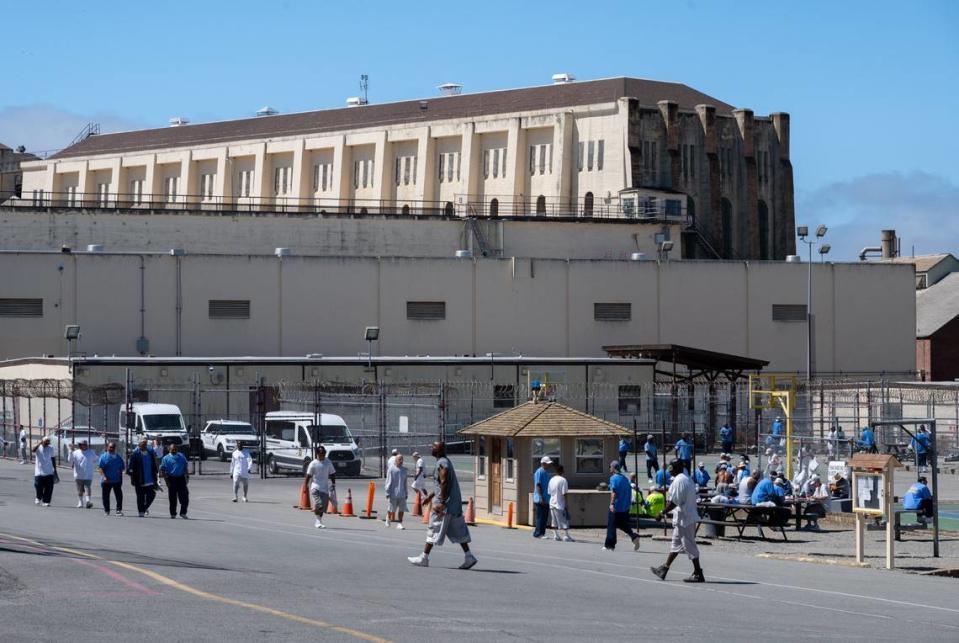California adds three-strikes crime for first time in 20 years. Will lawmakers push for more?
- Oops!Something went wrong.Please try again later.
- Oops!Something went wrong.Please try again later.
California is preparing to add a new crime to the list of those eligible for longer prison sentences under the state’s “three strikes” law. But criminal justice reform advocates worry about expanding the 30-year-old statute, saying it has not improved crime rates and disproportionately hurts communities of color.
Gov. Gavin Newsom in late September signed Senate Bill 14 from Sen. Shannon Grove, R-Bakersfield, which makes child sex trafficking a serious felony starting beginning Jan. 1.
That means those who were previously convicted of a different crime listed as a serious or violent felony — offenses considered “strikes” — could face double the prison time if they are later found guilty of child sex trafficking. People convicted of two previous strikable crimes could face 25 years to life in prison.
Grove’s bill marks the first time the state has added a crime to the list of strikable offenses in more than 20 years. Republicans and moderate Democrats have repeatedly tried to expand the list, but the deep-blue Legislature has typically shut down these efforts.
However, the outcry that occurred in July after Grove’s bill initially failed in the Assembly Public Safety Committee prompted involvement from Newsom and Assembly Speaker Robert Rivas, D-Hollister. That helped push SB 14 through both chambers and onto the governor’s desk.
Will SB 14 open the door for more three-strikes changes? Lawmakers still see those bills as a heavy lift, and advocates will continue to fight them tooth and nail.
“The real concern is whether or not new lawmakers who are looking to make a stand for themselves, to make a name for themselves are going to fall victim to this kind of approach that is great for sound bites, horrible for communities,” said Carmen-Nicole Cox, director of government affairs for ACLU California Action.

Three strikes and criminal justice reform
California leaders have spent the past decade-and-a-half overhauling harsh sentencing laws that led to the mass incarceration of Black and brown residents and created overcrowded prison conditions.
One of these laws was the so-called three strikes initiative, a 1994 ballot measure meant to lengthen prison sentences for Californians repeatedly convicted of felonies. More than 71% of voters approved three strikes in November 1994.
The law doubled prison time for those convicted of any felony after previously being found guilty of serious or violent felonies. Those with two convictions for strikable crimes who were later found guilty of any other felony faced 25 years to life in prison.
California leaders began changing laws like three strikes after a panel of federal judges in 2009 ordered the state to reduce prison overcrowding, a decision the U.S. Supreme Court affirmed in 2011.
In the years that followed, a combination of legislation and ballot initiatives resulted in changes that reduced some nonviolent crimes to misdemeanors, shifted some inmates from state prisons to county jails, and allowed prisoners to more quickly earn credits to shave down their sentences.
One of these reforms was Proposition 36, which revised three strikes by allowing 25-to-life sentences only in cases involving a third serious or violent felony, instead of any third felony. It also allowed resentencing for prisoners serving lengthy sentences for nonviolent and nonserious felonies. More than 70% of voters approved these changes in November 2012.
As of January 2022, more than 36% of those incarcerated in California were serving sentences lengthened by strike enhancements, according to a California Policy Lab study. About 28% of those prisoners were serving doubled sentences and nearly 8% were serving third-strike sentences.

Adding strikable crimes
Some of these reforms have pushed lawmakers to author bills adding strikable offenses, as they feel offenders are not serving long enough sentences. But they are not sure SB 14’s success can be replicated.
Those lawmakers believe changes like Proposition 57 — which allows inmates to more quickly earn sentence-shaving credits for participating in rehabilitative programming — have produced inappropriately short prison terms for some crimes.
Assemblyman Joe Patterson, R-Rocklin, authored Assembly Bill 229, which would have made domestic violence, human trafficking and rape of an intoxicated or unconscious person strikable offenses. His bill died in a Assembly Public Safety Committee hearing in March.
Patterson said he is still considering whether to bring his bill back in 2024, as it was “definitely soundly defeated, with some comments that didn’t indicate the committee members were very close to supporting it.”
When asked whether SB 14’s success makes him more optimistic about the future of such legislation, Patterson said he considers it “more of a one-off.”
“It doesn’t actually make me feel more emboldened,” he said. “It makes me feel concerned that it takes the absolutely most heinous crime and multiple hearings and the governor getting involved to actually pass something out.”
Sen. Marie Alvarado-Gil, D-Jackson, authored Senate Bill 268, which would have made rape of an intoxicated person a strikable offense. She held her bill in June ahead of an Assembly Public Safety Committee hearing. Alvarado-Gil said she is still considering whether to bring SB 268 back in 2024.
In a statement, she echoed some of Patterson’s remarks around SB 14’s passage.
“I commend and thank Senator Grove for her tenacity in getting SB 14 signed into law,” Alvarado-Gil said. “However, it is unfortunate that it only happened after immense media attention and public outcry resulting from the Assembly Public Safety Committee voting the bill down at first.”

Should California expand three strikes?
Criminal justice reform advocates are against any three strikes additions, and they believe the law has done more harm than good during its three-decade history.
Cox of ACLU California Action said three strikes can be used to coerce people into accepting plea deals, including minors who are at least 16.
“We start them young,” Cox said. “And we give him these strikes, and then they just follow them. And they make it harder to be a productive citizen, which makes it more likely that they will, in fact, be denied all of the resources they need to be productive and healthy.”
James King, co-director of programs for the Ella Baker Center for Human Rights, said policies around affordable housing, good jobs and resources in underserved communities better prevent crime than laws like three strikes. He said existing laws already require strict punishments for those convicted of crimes.
“If all it took was increased punishment to create safer communities, then some of our most policed and criminalized communities would be the safest of all of our communities,” King said. “But that’s not the case.”
Placer County District Attorney Morgan Gire said he thinks prosecutors should only apply three strikes in cases that involve “the worst of the worst.”
“I don’t think it’s the end all, be all approach,” Gire said. “But it is certainly one necessary component of the solution, if it is applied evenly, fairly consistently and in those cases that deserve it and warrant it.”
But Gire is against expanding three strikes.
“I wouldn’t want to add a felony onto the serious felony list simply so that we can impose strike dispositions to artificially lengthen a sentence that might be shortened by Prop. 57,” he said. “We need to fix Prop. 57. And we need to have sort of some truth in what those sentences are.”

